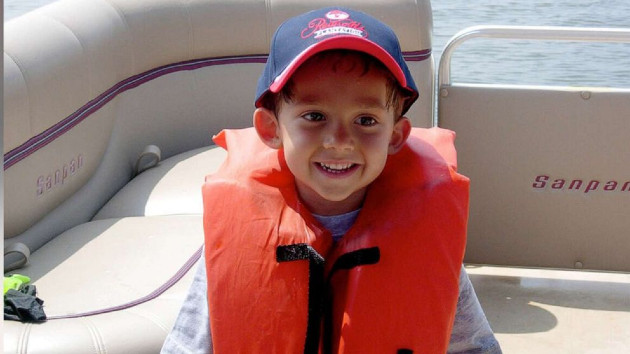
(NEW YORK) — Fifteen years after her son’s drowning death, a Connecticut mom has channeled her family’s grief and tragedy into a lifesaving mission, working to spread awareness about swimming and water safety.
Although it’s an important issue that applies year-round, it’s especially timely with the official start of summer coming up in two weeks. This season, the American Academy of Pediatrics is “urging families and caregivers to provide swim lessons” as parks and pools start to reopen following two years of temporary pandemic shutdowns and to implement safety measures such as ensuring fencing around pools and wearing life vests, according to a press release.
For kids between the ages of 1 and 4, drowning is the leading cause of death and for children between 1 and 14, it’s the second leading cause of death, according to the Centers for Disease Control and Prevention.
Tragedy in the water
Karen Cohn’s second child Zachary loved playing in the water and was “super happy” whenever he had the opportunity to do so, according to his mom. He was 6 years old in 2007 when the family moved into a house with a new pool.
“The house was a new house with a new pool and proper fencing was in place and there were alarms on the doors leading outside and we really made sure that the kids were closely supervised when they were swimming,” Cohn told ABC News’ Good Morning America.
“Unfortunately, we had no idea about drain entrapments, what a drain entrapment was,” she said. “We had no idea that it was even a risk in a pool. Never heard of it before.”
Drains are a part of the water filtration system in pools and help to circulate and clean the water. However, if a government-approved drain cover becomes loose or is missing, it could result in unsafe conditions.
“The cover had become loose over one of the drains in our pool and my son Zachary’s arm became stuck in it, and he was held underneath the water and we could not get him out,” Cohn said. “We knew that we had to shut down power in order to release him but the only way I knew how to shut down power at the time was to shut down power to the entire house. And so I did that and we did release him. And unfortunately, it was too late and he could not be resuscitated.”
The Cohn family was devastated after Zachary’s death but it became the catalyst for Karen Cohn’s new life mission. The following year, she and her husband Brian co-founded The ZAC Foundation in honor of their son.
The organization is “dedicated to improving water safety by funding advocacy, education and effective programming to safeguard children and their families,” according to its website.
Spreading the water safety message
Cohn also launched a “Keeping Kids Safe” podcast in 2021 to reach more parents during the pandemic with recent episodes such as “Data Driven Solutions for Drowning Prevention” and “From Family Tragedy to Positive, Lasting Change.”
Today, she works to educate other parents and the general public about how to enjoy the water in safer ways, whether it’s at a pool, at the beach or simply in your own backyard.
Here are her top tips, along with additional guidance from the Consumer Product Safety Commission and its Pool Safely campaign:
Water safety tips
- Talk to children to make sure they don’t play in water areas without adult supervision. Make sure kids never go into the water without permission.
- Keep your eyes on your kids. If your child doesn’t know how to swim, be sure they’re at arm’s length any time they are in or around water.
- Wear and have your children wear Coast Guard-approved life jackets in the water.
- If kids are wearing life jackets and or “puddle jumpers” in the water, talk to them first about what it feels like to be in the water without a life jacket on.
- Remove pool toys when not in use as children can be attracted to them.
- Empty the water from inflatable pools and buckets when not in use.
- Ensure there is four-sided fencing around backyard pools with self-closing, self-latching gates.
- Be sure there are alarms on doors and windows leading out to the pool area.
- Only swim where there are lifeguards supervising.
- Check flag warnings for water conditions and avoid getting into the water if conditions are unsafe.
- Create a water safety plan for you and your family, just like you would for a fire safety plan.
- Keep a phone nearby in case someone needs to call 911.
- Become your kids’ first line of defense and learn how to perform CPR.
“We always say it’s not a lack of supervision. Parents are busy, and especially now that they’re working from home in many cases, it’s a lapse of supervision,” Cohn said. “We just want to remind parents to be thinking about this, especially as it gets warmer and we’re going to be spending more time going into the water.”
Nikki Fleming, a spokesperson for CPSC, agreed.
“It’s so important to supervise kids in and around water each and every time,” Fleming told GMA. “Always designate a Water Watcher each and every time you’re in or around water. You want to make sure this person is not distracted, not using their cell phone, not reading a book like keeping their eyes on the children at all times.”
Fleming added that parents should ensure there are “multiple layers of protection to help keep your child safe.”
“This includes installing a four-sided four-foot fence with a self-closing self-latching gate. You want to make sure that gate closes each and every time you enter or exit the pool,” she said. “Also install door alarms or pool alarms. You want to be alerted to the fact if your child is trying to access the pool area, especially if one of the sides of your home acts as a barrier for that pool.”
When it comes to drain entrapments specifically, Fleming advised that parents “keep children away from drains and pool openings at all times.”
“This is important to avoid entrapment dangers in addition to drowning hazards,” she said. “Make sure that you have a pool that has the proper drain covers that meet federal safety standards. If you’re unsure, check with your pool safety operator or home maintenance operator.”
At the end of the day, Cohn said her biggest message to other parents is that “swimming is joyful.”
“We want families to have fun in the water. But we also want them to be educated about the risks that exist,” she said.
Copyright © 2022, ABC Audio. All rights reserved.





